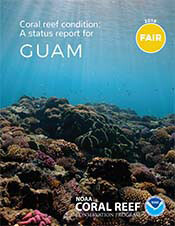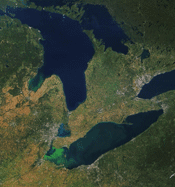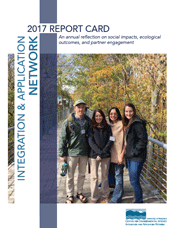Learn how to make an ecosystem health report card
Are you interested in learning the complete report card process to leverage real environmental change in your area? Join IAN's online science communication course and get familiar with all the steps from stakeholder mapping & engagement and conceptualizing ecosystem function to selecting indicators and benchmarks, analyzing data, and communicating results. Sign up or learn more here.Now available - Coral reef status reports for the Pacific jurisdictions
 Effective coral reef conservation cannot be accomplished without an informed and engaged public. Read the five coral reef status reports to find out more! These coral status reports provide communities and decision-makers with information about managing and conserving coral reef ecosystems in five Pacific jurisdictions (American Samoa, the Hawaiian Archipelago, the Pacific Remote Islands, Guam, and the Northern Marianas Islands. These status reports provide a geographically specific assessment of each jurisdictions' coral reef condition using four categories of coral reef health: corals and algae, fish, climate, and human connections. This project is a partnership between IAN and NOAA's Coral Reef Conservation Program.
Effective coral reef conservation cannot be accomplished without an informed and engaged public. Read the five coral reef status reports to find out more! These coral status reports provide communities and decision-makers with information about managing and conserving coral reef ecosystems in five Pacific jurisdictions (American Samoa, the Hawaiian Archipelago, the Pacific Remote Islands, Guam, and the Northern Marianas Islands. These status reports provide a geographically specific assessment of each jurisdictions' coral reef condition using four categories of coral reef health: corals and algae, fish, climate, and human connections. This project is a partnership between IAN and NOAA's Coral Reef Conservation Program.
Workshopping an environmental report card for the western basin of Lake Erie
 In November 2017, IAN staff Bill Dennison, Alex Fries, and Andrew Elmore led a workshop in Sandusky, OH for the Lake Erie Foundation to begin the process of designing an environmental report card for the western basin of Lake Erie. Workshop participants represented diverse stakeholders from state agencies, municipal governments, and private foundations, all focused on understanding and addressing threats to water quality and ecosystem health in the western basin. Of particular concern are reoccurring harmful algal blooms that have increasingly impacted the region over the past 5 years. Head over to this blog for more details.
In November 2017, IAN staff Bill Dennison, Alex Fries, and Andrew Elmore led a workshop in Sandusky, OH for the Lake Erie Foundation to begin the process of designing an environmental report card for the western basin of Lake Erie. Workshop participants represented diverse stakeholders from state agencies, municipal governments, and private foundations, all focused on understanding and addressing threats to water quality and ecosystem health in the western basin. Of particular concern are reoccurring harmful algal blooms that have increasingly impacted the region over the past 5 years. Head over to this blog for more details.
IAN releases its 3rd annual report card
 IAN recently completed IAN Report Card 2017 and made it available on IAN Press. The annual IAN report card is an annual summary of sorts, with the quintessentially-IAN report card spin. The report card reflects on IAN's social impacts, ecological outcomes, and partnership engagement in 2017. This year the social media indicators were revamped to reflect the engagement of IAN's follower on social media as well as its total reach through unique impressions. Working through the report card process allows staff and the admin team to appreciate its accomplishments as well as hone in on improvements to make in the next year. Overall IAN earned an A- (90%) in 2017.
IAN recently completed IAN Report Card 2017 and made it available on IAN Press. The annual IAN report card is an annual summary of sorts, with the quintessentially-IAN report card spin. The report card reflects on IAN's social impacts, ecological outcomes, and partnership engagement in 2017. This year the social media indicators were revamped to reflect the engagement of IAN's follower on social media as well as its total reach through unique impressions. Working through the report card process allows staff and the admin team to appreciate its accomplishments as well as hone in on improvements to make in the next year. Overall IAN earned an A- (90%) in 2017.
IAN welcomes Jennifer Clapper to the team
 Jennifer is the new Program Administrative Specialist with IAN in Cambridge, Maryland. Jennifer attended Wor-Wic Community College and was previously with the City of Salisbury Finance Department. Jennifer will spearhead trying to make sense of IAN's travel paperwork as well as other business office duties. Following the retirement of long-time IAN-organizer extraordinaire, Dottie Samonisky, Jennifer will have big shoes to fill, but she hopes to make the transition as smooth as possible for everyone. Jennifer is the mother to a 9 year old son and 5 year old daughter. When she isn't busy being a mom, she shoots pool in a league weekly which has taken her to Nationals in Las Vegas twice!
Jennifer is the new Program Administrative Specialist with IAN in Cambridge, Maryland. Jennifer attended Wor-Wic Community College and was previously with the City of Salisbury Finance Department. Jennifer will spearhead trying to make sense of IAN's travel paperwork as well as other business office duties. Following the retirement of long-time IAN-organizer extraordinaire, Dottie Samonisky, Jennifer will have big shoes to fill, but she hopes to make the transition as smooth as possible for everyone. Jennifer is the mother to a 9 year old son and 5 year old daughter. When she isn't busy being a mom, she shoots pool in a league weekly which has taken her to Nationals in Las Vegas twice!